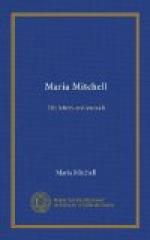“And now we looked around. What a strange orange light there was in the north-east! what a spectral hue to the whole landscape! Was it really the same old earth, and not another planet?
“Great is the self-denial of those who follow science. They who look through telescopes at the time of a total eclipse are martyrs; they severely deny themselves. The persons who can say that they have seen a total eclipse of the sun are those who rely upon their eyes. My aids, who touched no glasses, had a season of rare enjoyment. They saw Mercury, with its gleam of white light, and Mars, with its ruddy glow; they saw Regulus come out of the darkening blue on one side of the sun, Venus shimmer and Procyon twinkle near the horizon, and Arcturus shine down from the zenith.
“We saw the giant shadow as it left us and passed over the lands of the untutored Indian; they saw it as it approached from the distant west, as it fell upon the peaks of the mountain-tops, and, in the impressive stillness, moved directly for our camping-ground.
“The savage, to whom it is the frowning of the Great Spirit, is awe-struck and alarmed; the scholar, to whom it is a token of the inviolability of law, is serious and reverent.
“There is a dialogue in some of the old school-readers, and perhaps in some of the new, between a tutor and his two pupils who had been out for a walk. One pupil complained that the way was long, the road was dusty, and the scenery uninteresting; the other was full of delight at the beauties he had found in the same walk. One had walked with his eyes intellectually closed; the other had opened his eyes wide to all the charms of nature. In some respects we are all, at different times, like each of these boys: we shut our eyes to the enjoyments of nature, or we open them. But we are capable of improving ourselves, even in the use of our eyes—we see most when we are most determined to see. The will has a wonderful effect upon the perceptive faculties. When we first look up at the myriads of stars seen in a moonless evening, all is confusion to us; we admire their brilliancy, but we scarcely recognize their grouping. We do not feel the need of knowing much about them.
“A traveller, lost on a desert plain, feels that the recognition of one star, the Pole star, is of itself a great acquisition; and all persons who, like mariners and soldiers, are left much with the companionship of the stars, only learn to know the prominent clusters, even if they do not know the names given to them in books.
“The daily wants of the body do not require that we should say
“’Give me the ways of wandering
stars to know
The depths of heaven above
and earth below.’
But we have a hunger of the mind which asks for knowledge of all around us, and the more we gain, the more is our desire; the more we see, the more are we capable of seeing.




